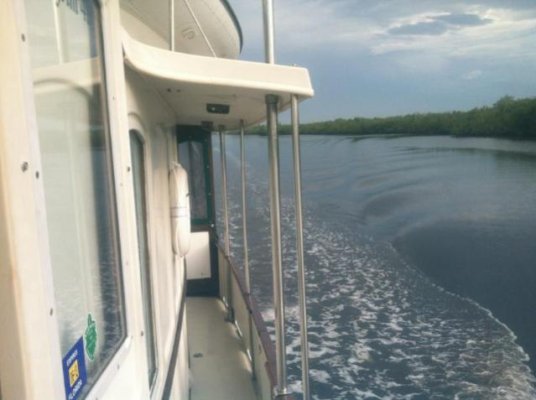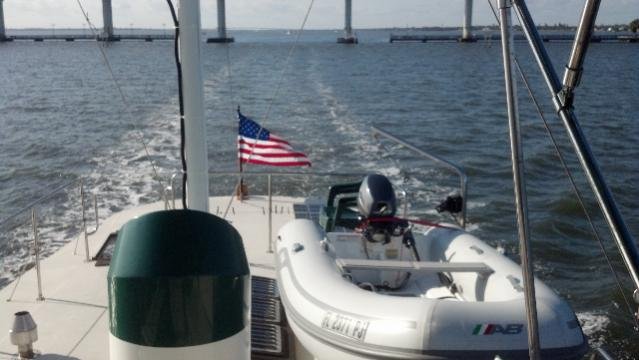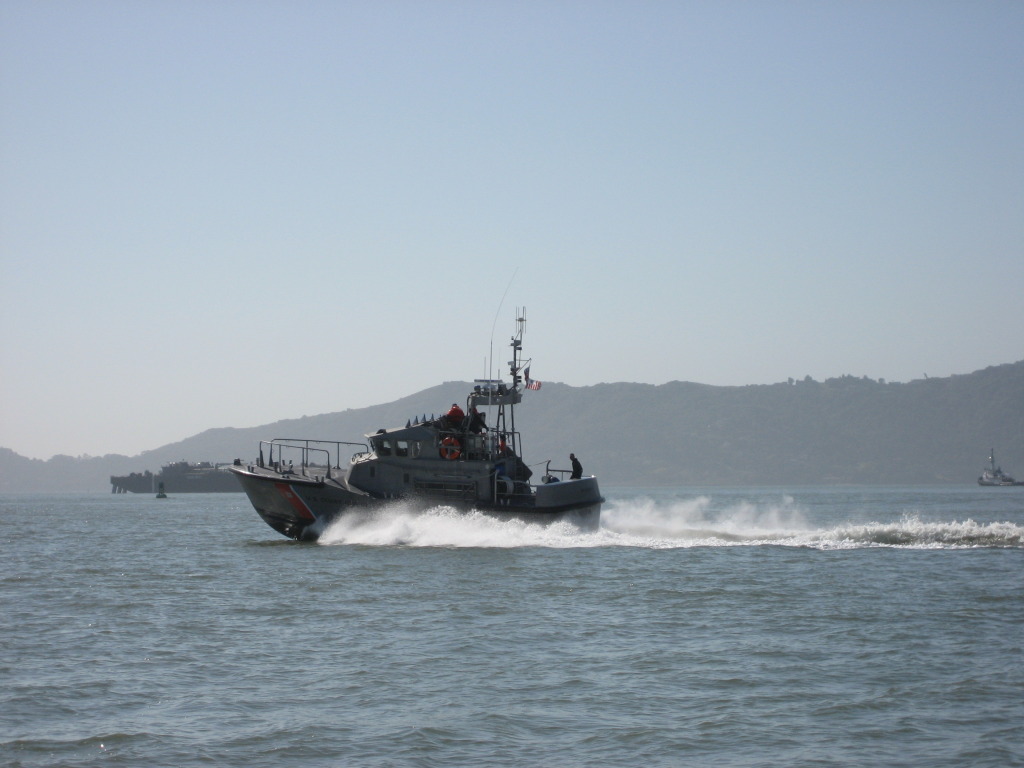healhustler
Guru
- Joined
- Oct 2, 2009
- Messages
- 5,198
- Location
- USA
- Vessel Name
- Bucky
- Vessel Make
- Krogen Manatee 36 North Sea
Couple's boat swamped by another
Officials emphasize safety in local waters
Posted: July 28, 2013 - 12:11am
By SHELDON GARDNER
sheldon.gardner@staugustine.com
Sandi and Jeffrey Lewis were fishing in their 14-foot boat near the Salt Run jetties July 21 when the unthinkable happened.
Another motor fishing boat, around 40 feet long, barreled by at approximately 30 to 40 mph.
“It was so instant, I looked back and my whole boat was full of water from the wake,” Jeffrey Lewis said.
The anchor line was pulled by the wake, and Jeffrey wasn’t able to cut the line in time.
“Within a matter of seconds, the boat totally flipped over,” Sandi Lewis said.
The Lewis’ incident lasted hours before it was finished and it cost them peace and property. Officials said boating accidents such as theirs happen several times a year, and common boating problems in St. Johns County waters are carelessness and lack of experience among boaters.
“I would say that several times a year we get smaller boats swamped by a larger boat,” said Florida Fish and Wildlife Conservation Commission Officer Mike Pedonti, who is investigating the Lewis’ case. “Nobody’s got a right to throw a wake that knocks somebody over.”
After the boat flipped, the Lewis’ climbed back on top of their boat’s hull. Belongings floated away in the water, including their fishing poles and her purse with wallet and bank cards, among other items. Some people picked up their property, but instead of returning it, drove their boats away.
Others ignored them as they waved for help.
Several boaters tried to help, including two young men, but were not able to tow the boat.
Sandi Lewis went with one boat to safety, but her husband stayed on the boat and drifted out the inlet. Rescue crews helped him flip his boat over and officials from a tow company arrived and towed him back and pumped the water out of the boat.
Lewis was able to recover his car keys, which were in the dry storage area.
“It ended up being over two and a half hours that I was in the ocean,” Jeffrey Lewis said.
He said his kidney was bruised after he fell while a group tried to tow his boat.
Their boat was fine, but Sandi Lewis has decided not to go boating again after what happened. The Lewis’ said they are concerned what could have happened if a child had been on the boat. The Lewis’ are now selling the boat.
“People don’t have respect for others any more,” she said.
Officer Mike Pedonti said no one was able to get a name of the boat that swamped them. It has been described as a dark-hulled or white boat. He is planning to interview other witnesses before completing the report.
Pedonti said boaters are required to maintain a certain distance only from military boats, but they are required to maintain a safe speed and be aware of docks in the area.
FWC Lt. Steve Zukowsky said that by maritime law, wake from a vessel is an extension of the vessel and boaters should maintain a 360 degree lookout. Anchored boaters should also maintain a 360 degree lookout.
U.S. Coast Guard Auxiliary Cmdr. David Patrick of local Flotilla 14-7 said everyone is responsible for their own wake on the waters, and often people don’t realize that when passing another boater. The auxiliary is the non-law enforcement arm of the U.S. Coast Guard. Officers patrol the area and make sure people are safely boating. They also perform free vessel checks and host boating safety courses.
Patrick said the area near Salt Run and the jetties is not a good place to anchor down and fish because of all the traffic. People should also know that they cannot anchor within the channel.
A couple of common problems that officers see on local waters are people dangling their feet over the bow of a boat, which is dangerous. Also, many people don’t wear life jackets.
“Over 80 percent of the drownings that happen, happen because people are not wearing life jackets,” Patrick said.
Patrick said there are life jackets available now that are not bulky and that inflate when they come in contact with the water.
“It’s too late to put it on when the boat is swamped,” he said.
Pedonti said common problems he sees are cases of boating under the influence, groundings, people operating boats carelessly and sometimes not obeying wake zones. People should be aware of what their wake can do.
“People should always be courteous to other boaters,” he said.
Officials emphasize safety in local waters
Posted: July 28, 2013 - 12:11am
By SHELDON GARDNER
sheldon.gardner@staugustine.com
Sandi and Jeffrey Lewis were fishing in their 14-foot boat near the Salt Run jetties July 21 when the unthinkable happened.
Another motor fishing boat, around 40 feet long, barreled by at approximately 30 to 40 mph.
“It was so instant, I looked back and my whole boat was full of water from the wake,” Jeffrey Lewis said.
The anchor line was pulled by the wake, and Jeffrey wasn’t able to cut the line in time.
“Within a matter of seconds, the boat totally flipped over,” Sandi Lewis said.
The Lewis’ incident lasted hours before it was finished and it cost them peace and property. Officials said boating accidents such as theirs happen several times a year, and common boating problems in St. Johns County waters are carelessness and lack of experience among boaters.
“I would say that several times a year we get smaller boats swamped by a larger boat,” said Florida Fish and Wildlife Conservation Commission Officer Mike Pedonti, who is investigating the Lewis’ case. “Nobody’s got a right to throw a wake that knocks somebody over.”
After the boat flipped, the Lewis’ climbed back on top of their boat’s hull. Belongings floated away in the water, including their fishing poles and her purse with wallet and bank cards, among other items. Some people picked up their property, but instead of returning it, drove their boats away.
Others ignored them as they waved for help.
Several boaters tried to help, including two young men, but were not able to tow the boat.
Sandi Lewis went with one boat to safety, but her husband stayed on the boat and drifted out the inlet. Rescue crews helped him flip his boat over and officials from a tow company arrived and towed him back and pumped the water out of the boat.
Lewis was able to recover his car keys, which were in the dry storage area.
“It ended up being over two and a half hours that I was in the ocean,” Jeffrey Lewis said.
He said his kidney was bruised after he fell while a group tried to tow his boat.
Their boat was fine, but Sandi Lewis has decided not to go boating again after what happened. The Lewis’ said they are concerned what could have happened if a child had been on the boat. The Lewis’ are now selling the boat.
“People don’t have respect for others any more,” she said.
Officer Mike Pedonti said no one was able to get a name of the boat that swamped them. It has been described as a dark-hulled or white boat. He is planning to interview other witnesses before completing the report.
Pedonti said boaters are required to maintain a certain distance only from military boats, but they are required to maintain a safe speed and be aware of docks in the area.
FWC Lt. Steve Zukowsky said that by maritime law, wake from a vessel is an extension of the vessel and boaters should maintain a 360 degree lookout. Anchored boaters should also maintain a 360 degree lookout.
U.S. Coast Guard Auxiliary Cmdr. David Patrick of local Flotilla 14-7 said everyone is responsible for their own wake on the waters, and often people don’t realize that when passing another boater. The auxiliary is the non-law enforcement arm of the U.S. Coast Guard. Officers patrol the area and make sure people are safely boating. They also perform free vessel checks and host boating safety courses.
Patrick said the area near Salt Run and the jetties is not a good place to anchor down and fish because of all the traffic. People should also know that they cannot anchor within the channel.
A couple of common problems that officers see on local waters are people dangling their feet over the bow of a boat, which is dangerous. Also, many people don’t wear life jackets.
“Over 80 percent of the drownings that happen, happen because people are not wearing life jackets,” Patrick said.
Patrick said there are life jackets available now that are not bulky and that inflate when they come in contact with the water.
“It’s too late to put it on when the boat is swamped,” he said.
Pedonti said common problems he sees are cases of boating under the influence, groundings, people operating boats carelessly and sometimes not obeying wake zones. People should be aware of what their wake can do.
“People should always be courteous to other boaters,” he said.






